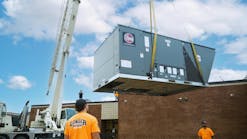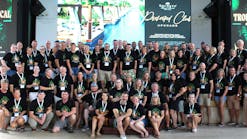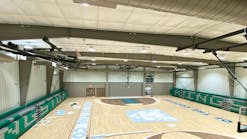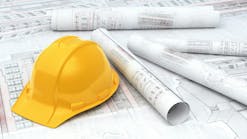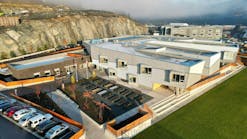With freezing temperatures upon us this winter, businesses can experience frozen pipes and loss of heat and electricity in their building. When harsh temperatures hit, it is always less expensive to be proactive than reactive. Periodic preventative maintenance, having a plan of action and mid-season HVAC equipment inspections can help prevent failures before they occur.
In the case of extreme weather conditions, facility owners should be proactive with ensuring their HVAC systems are up-to-date and functioning properly. Businesses can’t afford not to properly maintain their core systems. When a building has old or neglected systems that have not been properly maintained they will ultimately fail at some point in the future, potentially causing a loss of money, time and reputation for the building’s owner and/or its occupants.
Listed below are some tips about how building owners/operators can help properly maintain their systems during freezing temperatures and conditions:
1. WIFI thermostats or a building management system can be configured to alert building personnel if a low temperature condition occurs inside a building or an HVAC system has unexpectedly shutdown/failure. This will give a facility manager and/or building owner time to react to an issue before it becomes a disaster.
2. A backup generator can help maintain critical systems such as heat and electricity during storms or unexpected interruptions in utility power. For certain buildings, the generator can be enrolled in a utility demand response program which will help offset the cost of installation and usage. A win-win situation for the building and the utility.
3. Periodic preventive maintenance and mid-season HVAC equipment inspections can help predict failures before they occur. It's always less expensive to be proactive vs. reactive.
4. Build quality relationships with service providers you trust, that will service and maintain systems professionally and be there if you need them in case of emergency.
5. Develop a disaster preparedness plan for all facility personnel to follow in case an event strikes. Reach out to a damage restoration firm to establish a go-to resource in case they are needed at night, on weekends or holidays.
6. Contact your insurance agent to discuss what events are covered to make sure that the facility can get back to operation as soon as possible with limited business interruption.
7. Evaluate heating systems and add freeze protection such as antifreeze or low temperature safeties to safeguard freeze ups and failures.
It’s extremely important to keep the above tips in mind as buildings endure cold temperatures throughout winter, as well as when/if employees begin returning to their offices.
Bud Hammer is President of Atlantic Westchester, a premier commercial Heating Ventilation Air Conditioning (HVAC) company, located in Bedford Hills, NY, that services businesses throughout the NY Metro region. For more information, please visit: www.atlanticwestchester.com.
